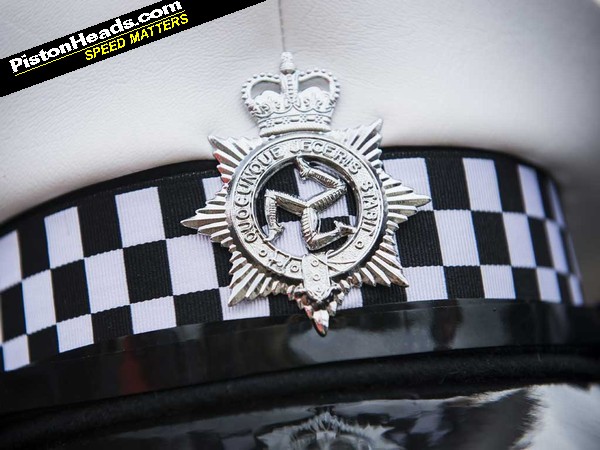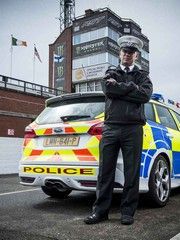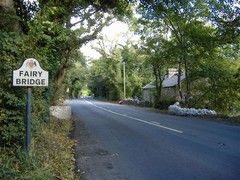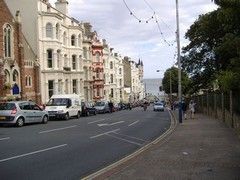Sergeant Allan Thomson: PH Meets
After yesterday's 'scamera' scare a more positive vision of road policing, courtesy of the Isle of Man's chief traffic cop

"We're unique here," he admits, "in that you can get off the boat and go up onto the mountain course and be doing 180mph within 15 minutes, without breaking the law."
That poses a serious challenge to Thomson and his small team, with just five constables permanently working on traffic enforcement. About a third of the island's road network has no upper speed limit, including nearly all of the famous Mountain section of the TT course. Predictably the island exercises a strong appeal to both bikers and drivers who want a chance to drive at the sort of speeds that would normally see them standing in front of a magistrate.
"We try to engage with people and to talk to them," says Thomson, "to treat them appropriately to make them behave better. We never forget this is the public road, not a racetrack... but we want you to come back next year and to tell your friends how good it is, how good the police are."
Things used to be different before Thomson took over the role, three years ago.
"The old culture was to put everybody in the book, not to ask questions or even to find out their story," he explains, "we used to site the speed traps on the exit to villages, where people are already excited and starting to go faster. I moved them back into the villages, so people could see why we were doing it, and we started to engage with people more - to explain what we were doing and why we were doing it, not just write tickets."
This resulted in a big reduction in both speeding convictions and - we presume - revenue from fines, but it also dramatically dropped both the incidents of the sort of anti-social behaviour the island used to be plagued by, and also crashes and accidents.
"It's all about establishing the idea that if you do wrong we're going to have a word with you," Thomson explains, "it's about painting a picture of the hazards over here, getting across that these are public roads. If you hurt somebody you are liable for it, regardless of whether there are any speed limits or not. But we want people to come over here and enjoy themselves... My guys used to be doing 12-hour shifts with eight hours of pinging people and another four writing it all up. Now they're on the road, trying to be in the right place at the right time."
This proactive approach hasn't won universal favour, Thomson admits to having been approached by a motorist during "Mad Sunday" - when the Mountain Course from Ramsey to Douglas is turned into a one-way road - who demanded he do something about the hordes of flat-out bikers: "He was a visitor, he'd somehow managed to come on holiday during TT week, and he couldn't understand it, he said to me 'what are you going to do about all of this?', I explained that I couldn't see anybody doing anything illegal. He didn't get it, I think he wanted me to arrest everybody."
The TT week is definitely the busiest time for the Manx traffic unit, with Thomson's team temporarily expanded to 22 officers, and with covert bikes sent out to keep an eye on things - these are apparently high-performance sports bikes rather than the normal BMW or Hondas.
"You wouldn't spot them, they're really well done," says Thomson, "and they're being ridden by people who really know what they're doing. If you see a big sign that says 'Covert Bikes Operating' the first thing you do is look in the mirror, and of course there's a bike behind you - is he one? Is the guy in front? Accidents went down as soon as we introduced them."
Perhaps surprisingly, the Manx constabulary don't use high-speed interceptors, having nothing faster than a Focus ST wagon. "You definitely need a car that you can make ground in," Thomson says, "but you're never going to be going as fast as some of the bikers. You can be driving at 100mph with the lights and sirens on and there will still be motorbikes whistling past like you're standing still."
In the past the Isle of Man tried to introduce speed cameras. "They didn't go down very well," says Thomson; apparently both had been broken within days of being installed. Now members of the community are trained to use laser speed guns and then pass the details of anyone driving or riding anti-socially onto the police. Being a relatively small island means it's never hard to find people. "We'll have a chat with the drivers or riders," says Thomson, "that almost always works. You might be surprised, it's really not like the Wacky Races over here."
Common sense speed enforcement that actually works? It'll never catch on...
Portaits: James Lipman
 ts. If you introduced a similar approach in the UK, you would have people driving like f
ts. If you introduced a similar approach in the UK, you would have people driving like f king idiots within 5-10 minutes and they'd continue to do so until they hit a wall.
king idiots within 5-10 minutes and they'd continue to do so until they hit a wall.Gassing Station | General Gassing | Top of Page | What's New | My Stuff






